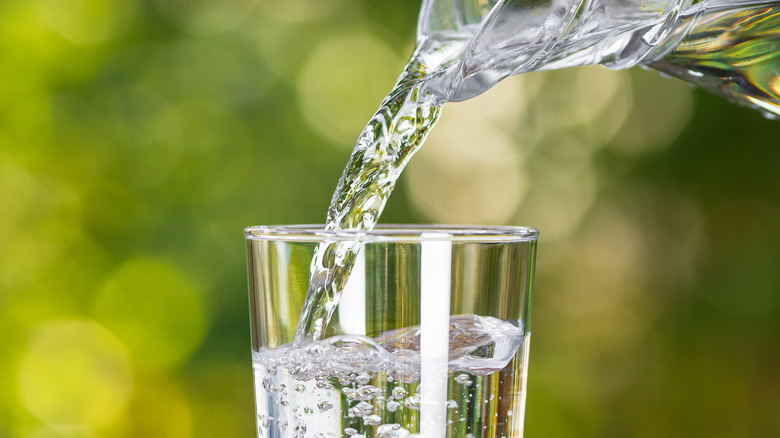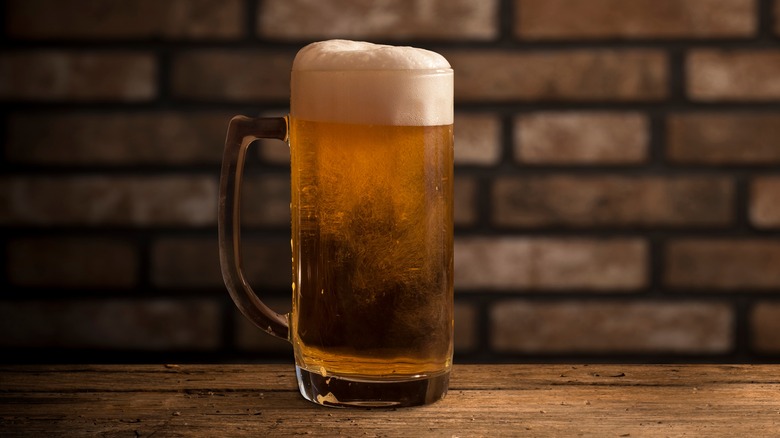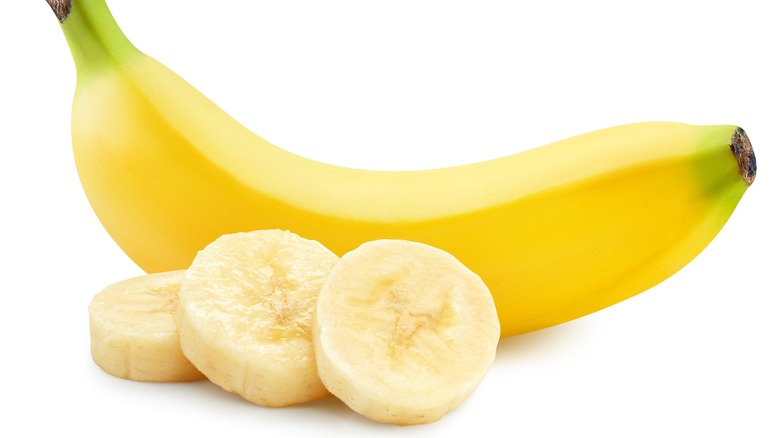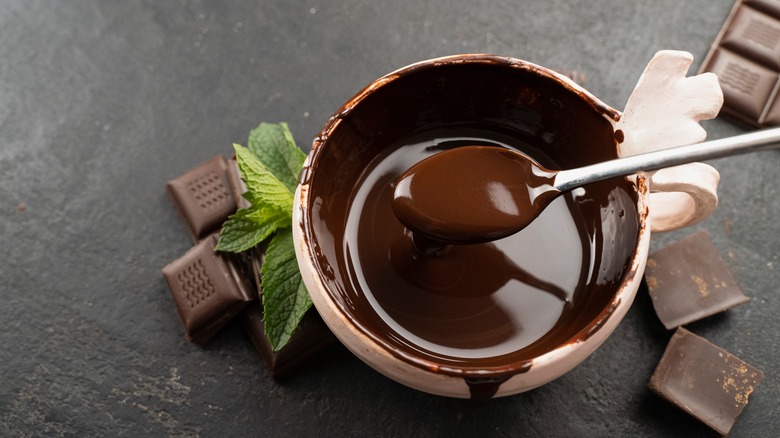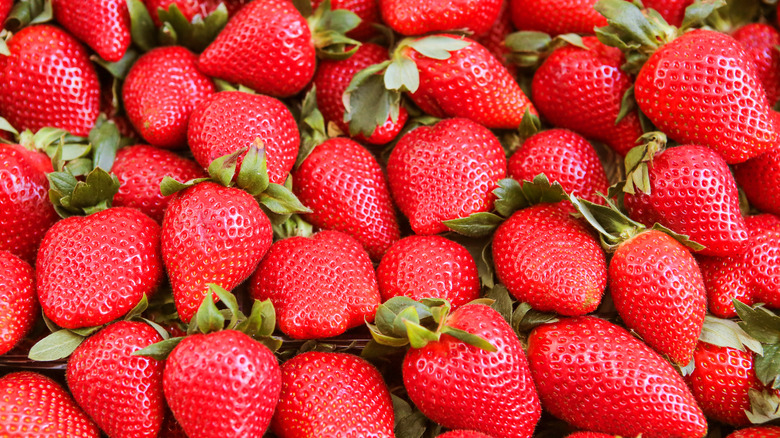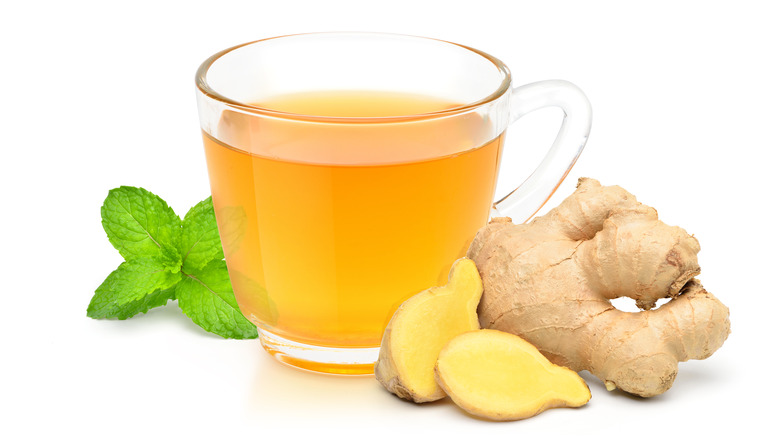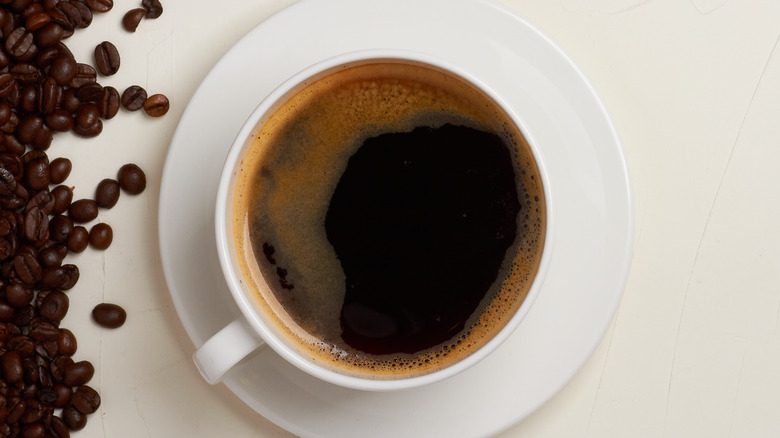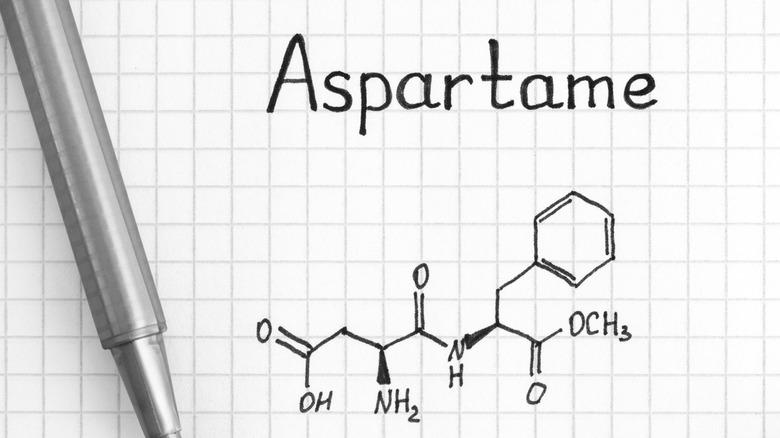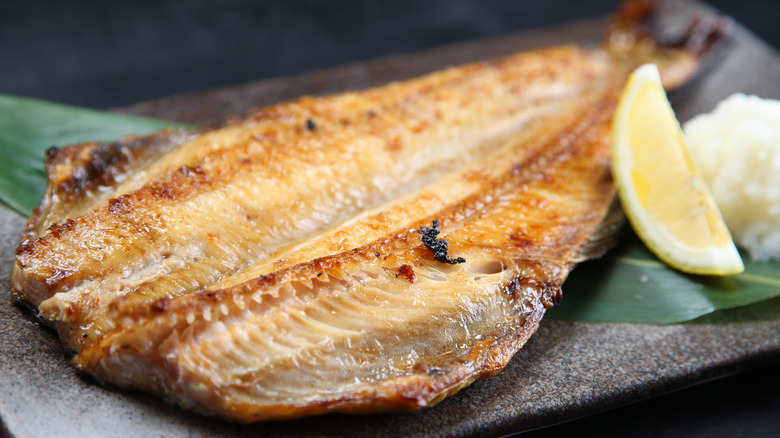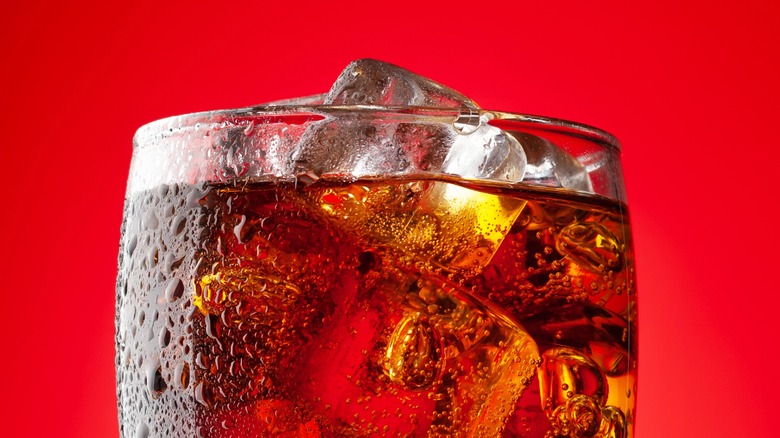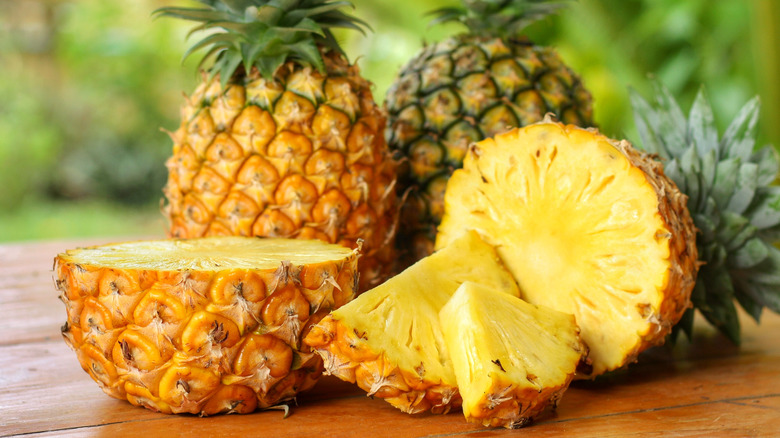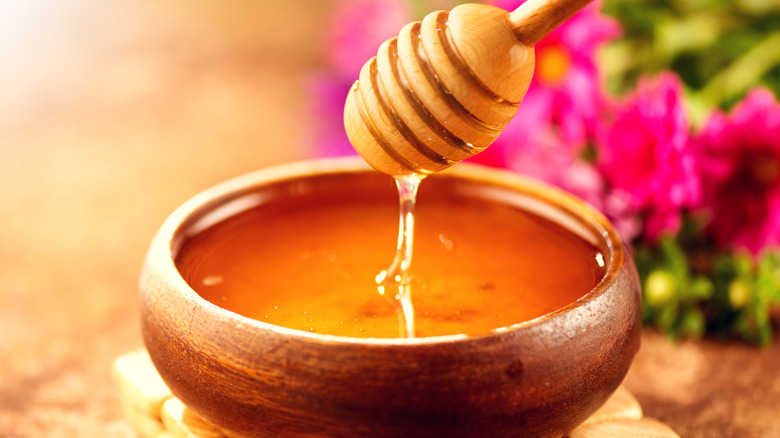7 Foods To Eat And 7 To Avoid For Vertigo
If you're a fan of Alfred Hitchcock's movies, a certain film starring Jimmy Stewart probably pops into your head when you hear the word "vertigo." But for others, that word is synonymous with a health issue that can make it seem like the world is spinning around them (via the Cleveland Clinic). Keep in mind that this is different than dizziness, even though the two terms are sometimes used interchangeably. That said, a person can become dizzy because of vertigo, and as the Mayo Clinic notes, someone with dizziness might also experience vertigo.
Now that we've cleared that up, let's address another misconception about vertigo. As the Cleveland Clinic explains, vertigo is a symptom, not a disease, that typically occurs because of health issues with one's inner ear or brain. For example, a person with traumatic brain injury or brain tumors could experience vertigo. That spinning room sensation can also happen during a migraine or because of conditions like multiple sclerosis, diabetes, and Ménière's disease. Even some medications list vertigo as a side effect.
The bottom line is that vertigo can occur for a variety of reasons, some more serious than others. So, if you're experiencing it, you should contact a medical professional immediately for a formal diagnosis. One of the topics you should discuss with them is possible changes to your diet, since certain foods might either help mitigate or worsen your vertigo. Let's learn more about them here.
Try: The right amount of water
Proper hydration is important for one's overall good health. But did you know that it's possible to overdo your water intake? Yes, you read that right. We often hear about the health problems associated with not drinking enough water, but drinking too much H2O can also be bad for you. And when it comes to vertigo, how much water you take in can make a big difference.
According to Westside Head & Neck, when a person is dehydrated, they might experience vertigo. One reason is because your brain depends on your circulatory system, just like your lungs, kidneys, muscles, tissues, etc. But being dehydrated can affect your circulatory system — and by extension, your brain. For example, your brain receives nutrients from your blood, but if not enough blood is reaching your brain, then you might experience vertigo-related lightheadedness. On the other hand, Upper Cervical Awareness explains that consuming too much water can throw off the nutrients and electrolytes in your brain, which can also cause vertigo.
So, how much water is right for you? Well, as the Mayo Clinic notes, that answer can vary based on factors like if you live in a hot or humid area of the world, if you're pregnant or breastfeeding, and if you have other health conditions (like a bladder infection).
Avoid: Alcohol
One too many alcoholic beverages affecting someone's senses and health is nothing new. But as Upper Cervical Awareness explains, drinking too much can cause vertigo, as well as other symptoms associated with it (like issues with balance, nausea, and vomiting). Overindulgence isn't the only way alcohol and vertigo can go hand in hand, though.
To really understand why alcohol can cause vertigo, we need to talk about our inner ears, which have canals containing fluid. Think of this fluid as part of your body's own personal GPS system, since it helps you figure out where you are in relationship to the world around you. Since drinking alcoholic beverages can make one dehydrated, this can affect that fluid in the inner ear, leading to your brain not getting the correct information about your positioning. Factor in how alcohol can directly affect the brain's ability to process signals, and it's no surprise that too much alcohol can lead to vertigo.
Now, you might be thinking, "I don't overindulge in alcohol, so it shouldn't give me vertigo." However, that's not necessarily the case. If you have reoccurring vertigo, then you might want to take alcohol off the menu entirely to prevent it from triggering your vertigo. And of course, if you have vertigo — especially if it keeps happening — speak with a medical professional. It's possible that a serious health concern is behind it.
Try: Bananas
If you have vertigo and aren't sure why, you might want to ask your doctor about a disorder known as Ménière's disease. According to the University of Iowa Hospitals & Clinics, this condition can affect both one's balance and hearing, since it involves the inner ear. The good news is that dietary changes can help treat Ménière's disease.
Let's back up for just one moment and talk about potassium. As Align Wellness Center explains, too much fluid in the inner ear can be the culprit behind vertigo. And fluid buildup is a hallmark of Ménière's disease (via the University of Iowa Hospitals & Clinics). Potassium, however, can help your body regulate its fluids, which means it might help with bouts of vertigo. Bananas are known for their potassium content, making them a potentially good food choice if excessive fluid in the inner ear is behind your vertigo attacks.
Besides potassium's connection to body fluid regulation, there's another reason why you might want to talk with a medical professional about adding bananas to your diet. Diuretics are sometimes used to treat this disorder, but that can lead to lower levels of potassium in the body. Eating bananas, however, can help offset this potassium loss. Additionally, potassium is an important nutrient for your muscles, nerves, and good health in general, per Harvard Health Publishing.
Avoid: Chocolate
Sorry to Willy Wonka and all the chocolate lovers out there, but unfortunately, there is a possible connection between vertigo and this sweet treat.
As WebMD points out, vestibular migraines don't always come with head pain. However, they are known for causing vertigo. In fact, they're sometimes called migraine-associated vertigo, as well as migrainous vertigo and migraine-related vestibulopathy). Whatever you call them, they can be very disruptive, and you might want to adjust your diet to help treat them.
Since vertigo can occur because of health problems affecting the inner ear, it's not surprising that vestibular migraines and vertigo can go hand in hand. After all, the vestibular part of the name indicates that this type of migraine involves the inner ear. Vestibular migraines can cause a wide variety of symptoms, like issues with balance, disorientation, nausea, and vomiting. A patient with this type of migraine might also become more sensitive to sounds and motion. For instance, if they were walking down the cereal aisle of the supermarket and tilted their head up to the top shelf, they might feel dizzy or sick.
With so many unpleasant possible symptoms, it's no wonder a vestibular migraine patient might want to cut potential common trigger foods like chocolate from their meal plan. So, if you suspect that your favorite candy bar is setting off your vertigo, you might want to keep a food journal and experiment with eliminating it from your diet.
Try: Strawberries
Did you know that when you eat a single strawberry, you're actually eating a bunch of tiny fruits? Yes, those tiny little "seeds" on the outside of a strawberry are actually the fruits, and the part we think of as the fruit is part of the strawberry flower (via Britannica). Despite their name, strawberries aren't true berries. But don't let that discourage you from adding them to your diet, especially if you have vertigo.
According to Upper Cervical Awareness, there's data supporting the notion that eating fruits that are rich in vitamin C can help reduce the severity of vertigo. Specifically, a study in Acta Oto-Laryngologica focused on vitamin C's impact on an inner ear disorder known as Ménière's disease. The research had 22 Ménière's disease patients increase their vitamin C over an eight-week period. Per the results, all but one patient found their vertigo had improved. Most of the time, when one thinks of foods containing vitamin C, the first thing that comes to mind is oranges. But WebMD notes that eight strawberries can contain higher amounts of vitamin C than an orange. Plus, strawberries have potassium, which can also help with Ménière's disease and vertigo (via Align Wellness Center).
Additionally, adding strawberries to your diet can help you increase your manganese and fiber intake, per WebMD. Plus, they're good sources of antioxidants. Besides vertigo, they may also be helpful for other health issues like high cholesterol and/or blood pressure.
Avoid: Certain cheeses
In the live action/animation hybrid movie "Chip 'n Dale: Rescue Rangers," the titular characters see firsthand how "stinky cheese" can be addictive for cartoon rodents. Of course, live action humans don't float in the air in a stupor when they smell cheese. But that doesn't mean certain cheeses can't be problematic for someone with vertigo.
As N8 Upper Cervical Chiropractic explains, it might be a good idea to cut down on foods that contain large amounts of the amino acid tyramine if you're experiencing migraine-related vertigo. This is because tyramine can be a trigger for migraines, including vestibular migraines, which are known for causing vertigo. And yes, aged cheeses can be loaded with this amino acid. Thus, you might want to cut back on cheeses like provolone, mozzarella, or Swiss cheese if you're prone to migraines. The Mayo Clinic mentions other cheeses to avoid because of their tyramine content, including blue cheeses, aged cheddar, Camembert, and parmesan.
If you love cheese but don't want to risk a migraine and a vertigo attack, there are options. Cheeses like ricotta, cream cheese, American cheese, and farmer cheese tend to be lower in tyramine. Nevertheless, you should exercise proper portion control, especially if you're sensitive to tyramine. One more tip: If you're unsure if cheese is a trigger for you, start keeping a journal and noting what cheeses you eat and when you get migraines and bouts of vertigo.
Try: Ginger
Ginger is legendary. No, seriously: Dr. James Duke, an authority on medicinal plants at the U.S. Department of Agriculture, told the Washington Post that there is a legend regarding ginger and a type of motion sickness. According to the story, fishermen chewed ginger root to keep themselves from becoming seasick.
Okay, but what does this have to do with vertigo? After all, when someone has vertigo, the world just seems to be moving around them (via the Cleveland Clinic). But as scientists have explored ginger as a potential treatment for seasickness, they've also found that it might help with vertigo as well (per The Washington Post). For instance, one study involving 80 naval cadets found that ginger root helped with seasickness in part by suppressing vertigo, nausea, and vomiting. Another study concerning motion sickness focused specifically on vertigo and concluded that ginger might help treat vertigo. It's important to note, however, that this study only involved eight participants and focused solely on inner ear-related vertigo. That said, the ginger was helpful for all eight subjects.
So, does this mean you need to chew on a ginger root if you have vertigo or motion sickness? Well, as Dr. Duke noted to the Washington Post, adding ginger powder or grated ginger root to tea, for example, is an option. Additionally, psychologist Daniel Mowrey, who has researched ginger and seasickness, told the Washington Post that eating plain, dry ginger can hurt your esophagus.
Avoid: Caffeine
Chocolate can be a trigger food for vestibular migraines, which are known to cause vertigo (via WebMD). But chocolate, as well as beverages like coffee, energy drinks, and certain teas, might also be bad choices for a patient with Ménière's disease because of their caffeine content (per Nutritional Neuroscience).
While we're still learning about Ménière's disease, we do know that it can cause several symptoms, including tinnitus and (of course) vertigo (via Better Health Channel). This is because when a person has Ménière's disease, fluid builds up in their inner ear, which can interfere with signals regarding hearing and balance reaching the brain. And sorry to all the coffee lovers out there, but consuming caffeine, especially in large amounts, can make one's blood vessels constrict and make symptoms of Ménière's disease like vertigo more severe.
As we explore Ménière's disease, scientists have also found evidence of caffeine being a potentially bad choice for someone at risk of developing this disorder. One such study in Nutritional Neuroscience monitored three groups: one of patients with Ménière's disease, one of vertigo patients who didn't have Ménière's disease, and one serving as a control group. The study's finding supported the recommendation to "reduce caffeine intake in those population groups with higher risk of Menière's disease (e.g. subjects with family members suffering from this disease)."
Try: Eggs
Ménière's disease and vestibular migraines can both cause vertigo. But as the Mayo Clinic points out, an extremely common reason someone might suddenly feel like the room is spinning is a condition known as benign paroxysmal positional vertigo (BPPV). Now of course, you should always have a medical professional diagnose the cause of your vertigo. That said, there are potential signs of this health concern.
According to the Mayo Clinic, if you have BPPV, then it's very likely that moving your head will set off a bout of vertigo. This is because there are tiny crystals inside your ear, which can become dislodged. When this happens, they can move around and make your body more sensitive to simple movements like lying down or tilting your head upwards. And per Healthline, diet could be a factor when it comes to vertigo attacks. In fact, research in Science Direct found evidence that not getting enough vitamin D could make BPPV symptoms more severe. Fortunately, eggs — and in particular, egg yolks — are a good source of this vitamin.
Although eggs might be a good food for you if you have BPPV, you should still check with a healthcare professional before making this change to your regular meal plan. Why? Well, as Healthline notes, you should have a medical professional check if your vitamin D is low (and how low it is) before trying to craft a BPPV-friendly menu.
Avoid: Aspartame
As Oxford Academic explains, aspartame is a white powder that is very sweet — as in, 200 times sweeter than sugar. Unsurprisingly, aspartame is used as a sweetener in many sugar-free things. But a big reason why concerns about consuming aspartame exist is because as it's processed by our bodies, part of it becomes methanol (via the American Physiological Society). And as Healthline points out, there is concern about methanol being potentially bad for one's health.
It's important to note that the Federal Drug Administration has deemed aspartame safe for use for the general population with the exception of individuals who have phenylketonuria (PKU), a disorder where the individual has problems breaking down an amino acid found in aspartame. However, Dovepress notes that someone who gets vestibular migraines (which can go hand in hand with vertigo, per Healthline) might want to cut out potential trigger foods like those containing aspartame.
If you're not sure if a product has aspartame, Healthline points out several key words and phrases to watch for like "sugar-free," "zero sugar," "reduced sugar," "sugarless," and "light." But if you really want to be sure, check the Nutritional Facts Label. Foods that might contain aspartame (depending on how they're made) include gums, sodas, salad dressings, candies, ice creams, and ketchups.
Try: Fish and shellfish
Even if the surf part of "Surf and Turf" isn't your thing, you might to reconsider. After all, certain nutrients found in fish and shellfish can be helpful if you're experiencing vertigo. As a matter of fact, not having enough of a certain vitamin they contain could be the reason behind your vertigo in the first place.
As Upper Cervical Awareness explains, cobalamin (a.k.a. vitamin B12) is crucial for your overall good health. Your nerves, your blood, and even your DNA all need this vitamin. So, if you have vitamin B12 deficiency (which can occur if you don't have enough of this vitamin in your diet), it can cause a number of symptoms, including vertigo. Fortunately, clams and fish can help up your B12 intake. For example, three ounces of cooked clams can give you 3,502% DV (the recommended daily amount) of vitamin B12 (via My Food Data). A single can of canned eastern oysters is packed with 2,168% DV of B12. Not a fan of shellfish? A cooked six-ounce fillet of Atlantic mackerel is loaded with 1,346% DV of B12.
Besides vitamin B12 deficiency, the Newport-Mesa Audiology Balance and Ear Institute notes that another reason someone might experience vertigo is because of Ménière's disease. However, eating foods rich in omega-3 fatty acids can help with this disorder. And as luck would have it, fish like cod, halibut, and salmon are all good sources of omega-3.
Avoid: Sodium
It's probably not surprising that sodium falls under the "avoid" category. Undoubtedly, you've read plenty of articles that recommend reducing the sodium in your diet for various health-related reasons. According to the Vestibular Disorders Association (VeDA), you might want to add Ménière's disease to that list. Ménière's disease affects the inner ear and can result in vertigo. Patients with this disorder sometimes find that certain things can trigger an attack. Now, these can range from being overworked to different aspects of a person's diet. And yes, too much salt is a potential trigger for Ménière's disease-related problems.
However, cutting down on the salt and in the process the sodium in your meals and snacks might not be as easy as it seems. As the American Heart Association notes, more than 70% of the sodium in most American's diets aren't because of adding a dash of table salt to a meal but because of packaged and processed food products. This includes foods like breads, regular and diet sodas, deli meats, canned foods, cereals, cheese, and frozen meals (via the Cleveland Clinic).
Thinking of exclusively opting for products containing sea salt? Unfortunately, as the Cleveland Clinic points out, sea salt has the same amount of sodium by weight as table salt.
Try: Pineapples
Poor pineapples. On the surface, their name just doesn't seem to make sense. After all, they aren't apples. But even if (unlike a couple in a certain song) you don't like piña coladas, you still might want to start adding this fruit to your meal plan if you have vertigo.
According to the Align Wellness Center, eating fruits that contain vitamin C can help lessen the severity of a bout of vertigo. And if you guessed that pineapples are a good source of vitamin C, you'd be absolutely right. As the U.S. Department of Agriculture (USDA) points out, 100 grams of raw pineapple are packed with 47.8 milligrams of vitamin C. Plus, WebMD recommends pineapple juice as a potential way to help keep the inflammation in your body at low levels because it contains vitamin C.
Besides being a good source of vitamin C, that same 100 grams of raw pineapple have 109 milligrams of potassium, as well as 13 milligrams of calcium and 12 milligrams of magnesium (via USDA). Pineapples also contain bromelain, which might aid with digestion and is being researched as a possible way to lower the chances of developing cancer. However, it's possible to be allergic to pineapples. In fact, if you have a latex allergy, you might have an allergic reaction to this fruit.
Avoid: Sugar
Having a sweet tooth and Ménière's disease can be a bad combination. As Healthline explains, this disorder involves a build up of fluid inside the inner ear. When this occurs, a person can experience vertigo. So, it's not surprising that eating foods that lead to water retention can be bad for someone with Ménière's disease.
You've probably heard that salt can cause you to retain more water, but so can sugar. This is because of a domino effect that takes place when one eats large amounts of sugar. Basically, that sugar triggers an insulin response, which can lead to your body retaining more sodium and in turn more water. Specifically, simple sugars like the kind in high-fructose corn syrup, honey, candy, chocolate, and good old fashioned table sugar can all be not good choices for someone with Ménière's disease.
While some sweet treats can be off the table for a person with Ménière's disease, that doesn't mean there are no sweet options for them. For instance, fresh fruits are sweet and have low amounts of sodium. Foods like sweet potatoes have larger amounts of complex sugars, which can be a better choice. Nevertheless, always speak with your doctor before making any additions to or eliminations from your diet.


